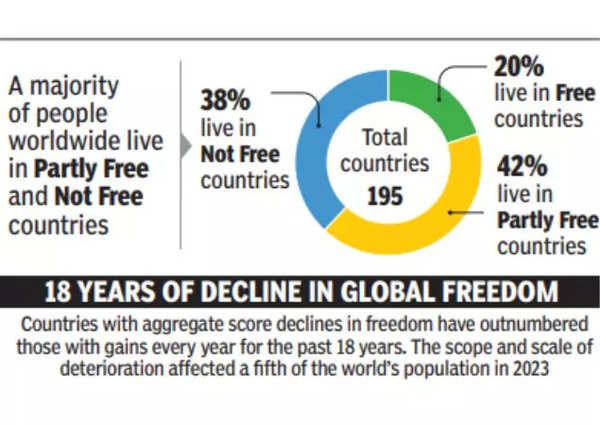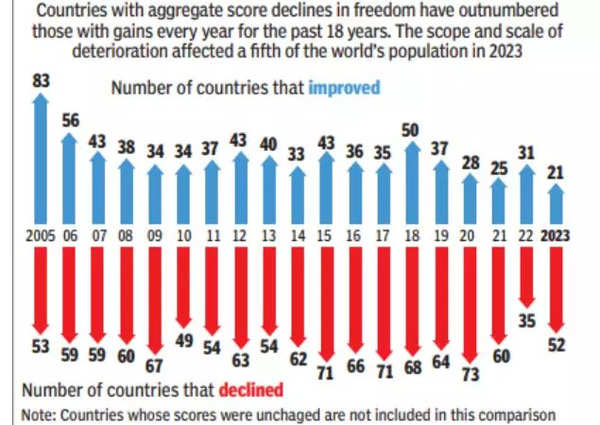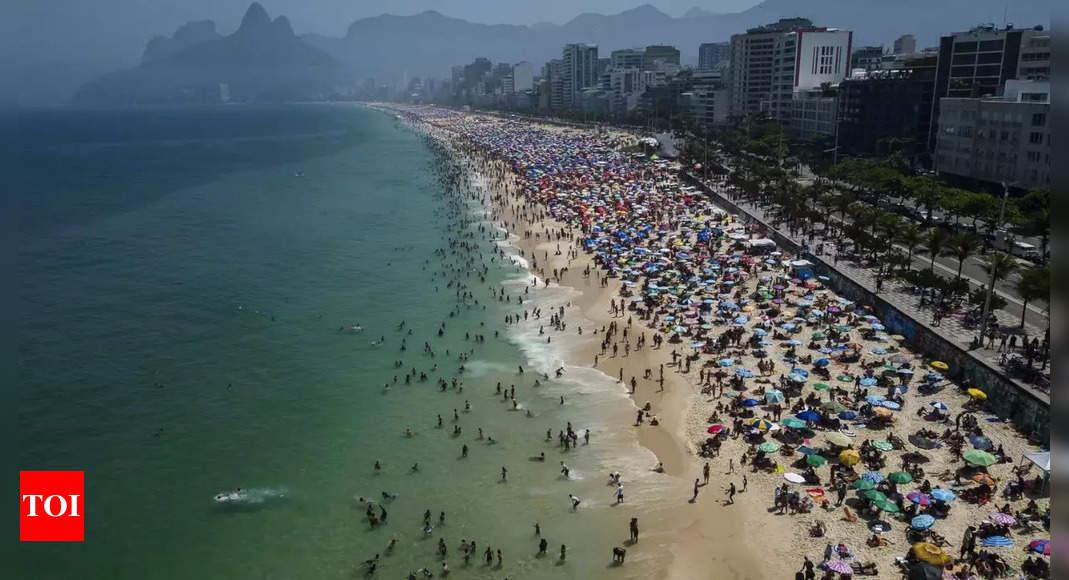
Flawed elections and armed conflict are eroding freedoms across the world, says a new report by Washington, DC-based non-profit Freedom House. It says political rights and civil liberties improved in 21 countries but declined in 52 others last year, affecting more than one-fifth of the global population.
It was the 18th consecutive decline. Last time the world showed improvement overall was in 2005, when 83 countries moved up the scale and 53 slipped.


Flawed Polls: The report says violence and manipulation in elections are largely responsible for clipping people’s freedoms. Ecuador, for example, was downgraded from ‘free’ to ‘partly free’ because gangs eliminated several state officials and political candidates there. Niger saw the second largest drop last year after the military ousted its elected govt. Polls have been manipulated in several ways, including by closing the field to rivals. “Another common method of pre-election manipulation is to change electoral rules in ways that help incumbents compete or simply allow them to run despite constitutional term limits.”
Risks Of Violence: The report says poll violence not only sidelines candidates but also keeps citizens away from the voting booth. “A loss of confidence in electoral institutions can contribute to voter apathy, significantly weakening the legitimacy of elected governments… A chain reaction of disappointment and disengagement then opens the door to authoritarian threats from within the country as well as from abroad.” Coups are another form of violence that undermines democracy and erodes freedom. “Not only are coups multiplying, but coup leaders are increasingly expressing solidarity with one another, further contributing to the erosion of democratic norms,” the report says.
Disputed Territories: People living in disputed territories are “especially vulnerable to abuses by authorities with no meaningful checks on their power”. Prominent examples are Beijing’s clampdown on freedoms in Hong Kong and Tibet, Russian repression in Crimea, and also Israel’s violation of basic rights in the West Bank and Gaza Strip.
Pluralism Waning: Along with freedom, the idea of pluralism – peaceful coexistence of people with different political ideas, religions or ethnic identities is also under threat from authoritarian leaders and armed groups. The report says, “Almost everywhere, the downturn in rights was driven by attacks on pluralism.”
Significant Year: Manipulated elections affected the rankings of 26 countries last year. This year, almost half of the world population will vote to elect new govts. Polls are scheduled in India, South Africa and the US – “three of the most influential democracies in the world”. Altogether, more than three dozen countries will see national polls in 2024 “and many more will conduct other types of balloting”.
It was the 18th consecutive decline. Last time the world showed improvement overall was in 2005, when 83 countries moved up the scale and 53 slipped.


Flawed Polls: The report says violence and manipulation in elections are largely responsible for clipping people’s freedoms. Ecuador, for example, was downgraded from ‘free’ to ‘partly free’ because gangs eliminated several state officials and political candidates there. Niger saw the second largest drop last year after the military ousted its elected govt. Polls have been manipulated in several ways, including by closing the field to rivals. “Another common method of pre-election manipulation is to change electoral rules in ways that help incumbents compete or simply allow them to run despite constitutional term limits.”
Risks Of Violence: The report says poll violence not only sidelines candidates but also keeps citizens away from the voting booth. “A loss of confidence in electoral institutions can contribute to voter apathy, significantly weakening the legitimacy of elected governments… A chain reaction of disappointment and disengagement then opens the door to authoritarian threats from within the country as well as from abroad.” Coups are another form of violence that undermines democracy and erodes freedom. “Not only are coups multiplying, but coup leaders are increasingly expressing solidarity with one another, further contributing to the erosion of democratic norms,” the report says.
Disputed Territories: People living in disputed territories are “especially vulnerable to abuses by authorities with no meaningful checks on their power”. Prominent examples are Beijing’s clampdown on freedoms in Hong Kong and Tibet, Russian repression in Crimea, and also Israel’s violation of basic rights in the West Bank and Gaza Strip.
Pluralism Waning: Along with freedom, the idea of pluralism – peaceful coexistence of people with different political ideas, religions or ethnic identities is also under threat from authoritarian leaders and armed groups. The report says, “Almost everywhere, the downturn in rights was driven by attacks on pluralism.”
Significant Year: Manipulated elections affected the rankings of 26 countries last year. This year, almost half of the world population will vote to elect new govts. Polls are scheduled in India, South Africa and the US – “three of the most influential democracies in the world”. Altogether, more than three dozen countries will see national polls in 2024 “and many more will conduct other types of balloting”.
Source link

